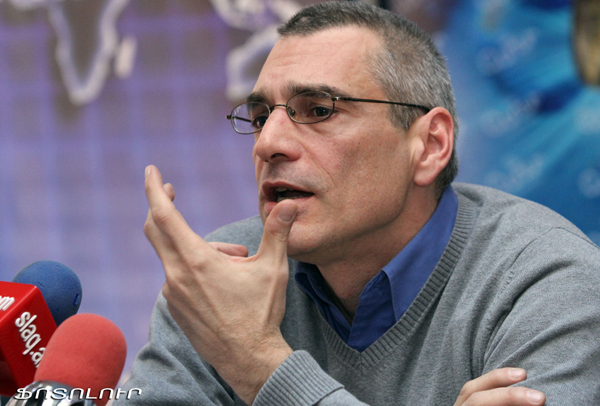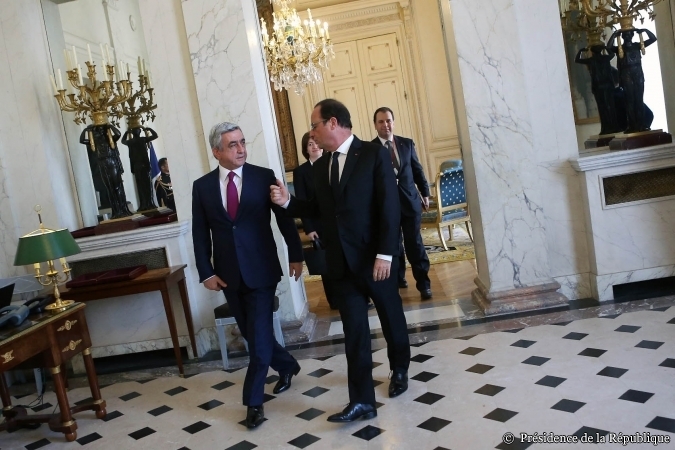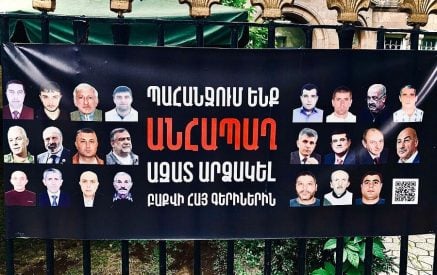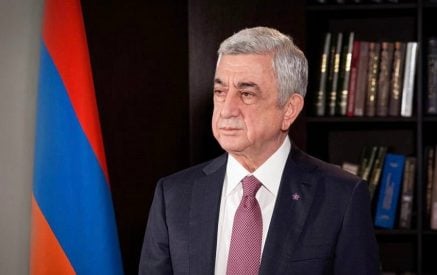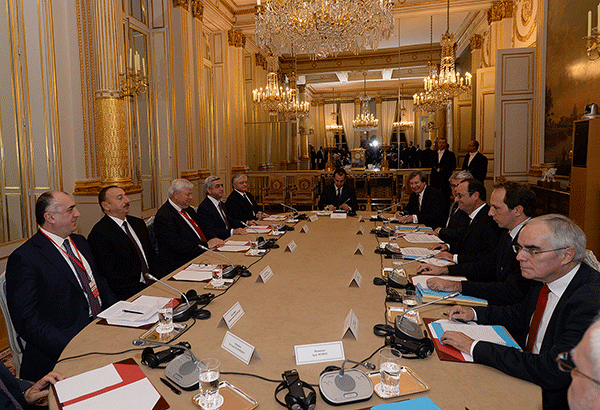According to Richard Giragosian, the Paris meeting was “a move by the Minsk Group to act against Putin’s unilateral meetings”
Regarding the negotiation round on the Nagorno-Karabakh conflict held in Paris on October 27, under the initiative of the President of France, the press release of the French presidential press service reported that Serge Sargsyan and Ilham Aliyev agreed to continue the dialogue, including meeting at the next session of the United Nations’ General Assembly next year in New York.
As reported by the French side, François Hollande urged Serzh Sargsyan and Ilham Aliyev to intensify their efforts in the settlement of the conflict in the framework of the international law and the OSCE MG outlined principles. Hollande urged the presidents of Armenia and Azerbaijan to demonstrate a political will to overcome the discrepancies and prepare the people for peace. He considered preservation of the status quo unacceptable, offering to elaborate a comprehensive peace agreement. The OSCE Minsk Group Co-Chair James Warlick, who described the Sargsyan-Aliyev meeting in Paris a positive step, posted a comment in his Twitter microblog, “I think that the presidents of Armenia and Azerbaijan would agree that the Paris meeting was a positive step.”
Read also
Official Yerevan, represented by Armenia’s Foreign Minister Edward Nalbandyan, described the Paris talks as “constructive, productive, useful and sincere.” “The meeting discussed many issues related to the settlement of Nagorno-Karabakh conflict, also to the confidence-building measures, which were proposed still by Francois Hollande during his visit to the region in May, and which were also welcomed by the three Co-Chairs. Our approaches are the same as that of the three Co-Chairs. The kind of confidence measures may create good conditions for recording progress in the negotiation process. Azerbaijan’s approach is a little different. They approach, so to speak, from the other end, because they think that progress in the negotiations may create conditions for the confidence-building measures. Naturally, it’s a slightly different approach, but it is a popular approach, which has been also in the past,” clarified Nalbandyan.
“Aravot” asked the Director of the Center for Regional Studies Richard Giragosian what it is caused by that, first of all, the mediators recently have great difficulty in organizing the negotiations between Armenia and Azerbaijan, and if they are successful, the result, perhaps, is that the parties agree to continue to meeting. The most important thing is that the Paris meeting revealed one significant observation: that it is no surprise that there is no surprise. It is not surprising that there is no surprise. The main obstacle here is clearly Azerbaijan, not because we want to criticize Azerbaijan or to take a pro-Armenian position, but clearly, that Azerbaijan’s diplomatic strategy is neither diplomatic nor strategic. It’s maximalist and their approach in the peace process is to demand everything and more. While it’s important that the meeting is continual, of course. Unfortunately, Armenia has no partner for peace. But the Paris meeting was important for another reason beyond Armenia and Azerbaijan. That was for the Minsk Group to defend itself against Putin and the Sochi unilateral meeting,” said Richard Giragosian.
There is no conflict, direct conflict, unresolved conflict or peace process between Armenia and Russia, what I meant specifically was Armenia has no partner for peace regarding the Karabakh peace process, but regarding your question, Russia is a strategic partner of Armenia but for many years was neither strategic nor partner. To our observation that it is constantly delivered to our public that Russia is Armenia’s security guarantor, the guarantee of relative peace in Karabakh, and at least so the ruling Republicans were reasoning the decision of our country’s accession to the Customs Union, hence, whether the position of Director of the Center for Regional Studies that Armenia has no partner for peace does not refer to Russia, too. Richard Giragosian disagreed with us, explaining, “No, there is no direct conflict, unresolved conflict or peace process between Armenia and Russia, what I meant specifically was Armenia has no partner for peace regarding the Karabakh peace process, but regarding your question, Russia is a strategic partner of Armenia but for many years it is neither strategic nor partner for Armenia.”
Emma GABRIELYAN



















































